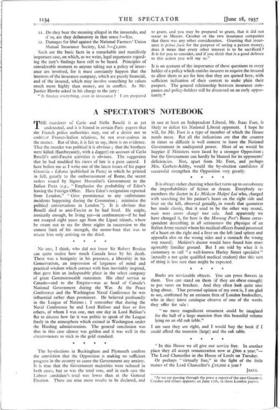A SPECTATOR'S NOTEBOOK
THE murderer of Carlo and Nello Roselli is as yet undetected, and it is hinted in certain Paris papers that the French police authorities may, out of a desire not to embintr Franco-Italian relations, be not over-zealous in the matter. But of that, it is fair to say, there is no evidence. That the murder was political it is obvious ; that the brothers were killed (flamboyantly, with a dagger) on account of Carlo Roselli's anti-Fascist activities is obvious. The suggestion that he had modified his views of late is a pure canard. I have before me as I write one of the latest issues of his paper Giustizia e Liberia (published in Paris) in which he printed in full, greatly to the embarrassment of Rome, the secret orders issued by Signor Mussolini's Government to the Italian Press (e.g., "Emphasise the probability of Eden's leaving the Foreign Office. Have Eden's resignation reported from London," " Give prominence to any unfortunate incidents happening during the Coronation ; minimise the political conversations in London "). It is obvious that Roselli died as anti-Fascist as he had lived. He might, ironically enough, be living yet—in confinement—if he had not escaped eight years ago from the Lipari islands, where he swam out to sea for three nights in succession to the utmost limit of his strength, the motor-boat that was to rescue him only arriving on the third.
* * * *
No one, I think, who did not know Sir Robert Borden can quite realise how much Canada loses by his death. There was a benignity in his presence, a liberality in his Conservatism, an impression of largeness of mind and practical wisdom which contact with him inevitably inspired, that gave him an indisputable place in the select company of great Commonwealth statesmen. His chief service to Canada—and to the Empire—was as head of Canada's National Government during the War. At the Peace _Conference and the Washington Naval Conference he was influential rather than prominent. He believed profoundly in the League of Nations ; I remember that during the Naval Conference he and Lord Balfour and four or five others, of whom I was one, met one day in Lord Balfour's flat to discuss how far it was politic to speak of the League freely in the atmosphere which existed in Washington under the Harding administration. The general conclusion was that in this case silence was golden and it was well in the circumstances to stick to the gold standard.
The by-elections in Buckingham and Plymouth confirm the conviction that the Opposition is making no sufficient progress in the country to cause the Government any anxiety. It is true that the Government majorities were reduced in both cases, but so was the total vote, and in each case, the Labour candidate's total was lower than at the General Election. There are nine more results to be declared, and in one at least an Independent Liberal, Mr. Isaac Foot, is likely to defeat his National Liberal opponent. I hope he will, for Mr. Foot is a type of member of which the House needs more. But all the indications are that the country in times so difficult is well content to leave the National Government in undisputed power. Most of us would be happier if Ministers were faced by a stronger Opposition ; but the Government can hardly be blamed for its opponents' deficiencies. Nor, apart from Mr. Foot, and perhaps Mrs. Corbett-Ashby, would the by-election candidates if successful strengthen the Opposition very greatly.
* * * * It is always rather cheering when fact turns up to corroborate the improbabilities of fiction or drama. Everybody re- members the doctor in Le Medecin Malgre Lui who, charged with searching for his patient's heart on the right side and liver on the left, observed genially, in words that quotation has made classic, that it used to be the other way round, mais nous avons change tout cela. And apparently we have changed it, for here is the Morning Post's Rome corre- spondent describing in all seriousness the physique of an Italian Army recruit whom his medical officers found possessed of a heart on the right and a liver on the left (and spleen and appendix also on the wrong sides and a stomach the wrong way round). Moliere's doctor would have found him most agreeably familiar ground. But I am told by what it is customary to call " a well-known Harley Street specialist" (actually a not quite qualified medical student) that this sort of thing is less rare than might be expected.
* * * * Books are serviceable objects. You can press flowers in them. *You can stand on them (if they are obese enough) to put vases on brackets. And they often look quite nice lying about. That personal opinion of my own is, I am glad to see, confirmed by an eminent firm of London booksellers, who in their latest catalogue observe of one of the works they offer for sale : " no more magnificent ornament could be imagined for the hall of a large mansion than this beautiful volume lying on an old oak table."
I am sure they are right, and I would buy the book if I could afford the mansion (large) and the oak table.
* * * * " In this House we all give our service free. In another place they all accept remuneration now at L600 a year."— The Lord Chancellor in the House of Lords on Tuesday.
Or perhaps " virtually free," in the light of the little matter of the Lord Chancellor's Lio,000 a year ?
JANUS.
*As we are passing through the press a report of the case Groom v. Crocker and others appears, on June 57th, in three London papers.














































 Previous page
Previous page